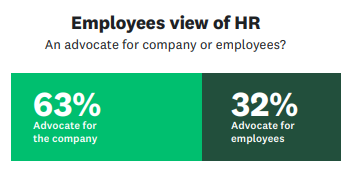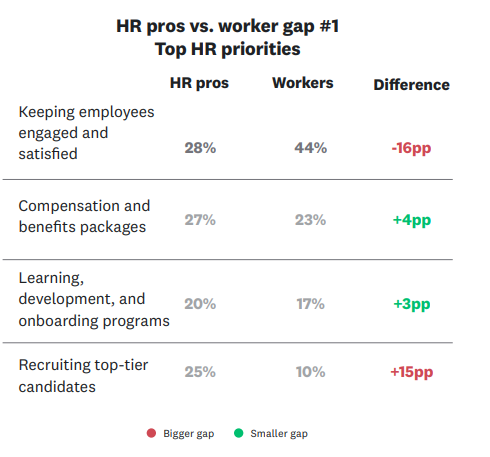SurveyMonkey: 7 in 10 workers trust HR, but 39% feel uncomfortable giving honest feedback
HR, it’s time to create a culture of listening. UNLEASH digs into SurveyMonkey’s latest report with the help of the survey software company’s Senior Manager, Research Science, Wendy Smith.
News In Brief
HR are always treading the line between the business and employees.
Research by SurveyMonkey found that their success is determined by honest feedback from employees, but 39% of employees actively feel uncomfortable doing so!
This is huge issue, so what's the solution? UNLEASH unpicks the data with the survey software giant's Senior Manager of Research Science, Wendy Smith.
HR now has a seat at the strategy table.
According to research by survey software giant SurveyMonkey, almost half (46%) of HR leaders believe they now have a leading role in company strategy, with a further 48% saying they have some influence.
Six in ten of the 300 HR leaders surveyed said they felt their leadership team believes HR is essential to building a successful workplace, with 44% saying HR is vital for creating a culture of success.
HR teams are optimistic about the future of their function as a strategic partner to the business (81%) – for seven in ten their job satisfaction has grown in the past year.
Of course, working for the business is only one part of HR’s job – they are also there to support employees.
SurveyMonkey’s found that HR leaders are well aware of this, but do employees agree?
The survey software giant also surveyed 2,500 US workers as part of the report – they found that while 71% employees said they trust HR, they still see HR as more on the side of employers (not employees).

Credit: SurveyMonkey, Bridging the HR Gap.
This suggests there is a perception gap between HR and employees on their relationship, and what HR should prioritize.
HR says that employee voices are important in driving employee experience (35%), but only 21% of employees agree.
Instead, employees think that leadership (31%) and managers (47%) have the biggest impact on employee experience. Those figures are 30% and 35% respectively for HR.
Plus, as SurveyMonkey’s Senior Manager of Research Science Wendy Smith tells UNLEASH in an exclusive interview, there are also “significant gaps around many crucial areas, including employee voice, worker feedback, AI, and the impact of HR”.

Credit: SurveyMonkey, Bridging the HR Gap.
Of course, HR’s roles and responsibilities are both to employees and employers; they act as a middle person between the sometimes competing priorities of companies and their workers.
Four in ten HR leaders said that leadership often gets in the way of HR’s effectiveness.
However, in this challenging labor market, this divide between HR and employees “has the potential to negatively impact employee experience, company culture, workplace expectations, and so much more”, adds SurveyMonkey’s Smith.
The role of open feedback in driving employee engagement
SurveyMonkey’s data shows that 86% of HR leaders say leadership understands employees’ needs, but only 35% of workers agree.
Interestingly, this figure for employees jumps to 80% where employees feel like they can provide open and honest feedback to HR and the leadership teams.
The issue is that 39% employees actively feel uncomfortable sharing feedback about their work experiences with HR, while 30% are only somewhat comfortable.
This is because 44% don’t think their feedback will actually drive meaningful change, 29% worry their feedback is not actually anonymous, and 24% said their organization has no culture of feedback.
80% of HR professionals found this very concerning– but what’s the solution?
It is clear that building culture of listening is absolutely key to HR’s success – “HR teams are only as effective as their ability to collect authentic feedback from their employees”, stated SurveyMonkey’s Report.
A culture of listening requires HR to reassure employees that their feedback is anonymous, and actually “taking action based on worker feedback and highlighting how feedback is being used to promote employee wellbeing”, shares Smith.
The report found that when HR teams are proactive with feedback it can lead to 39% of workers who previously didn’t feel comfortable going on to provide feedback – this is because they have “tangible proof that their input matters and is being used for change”.
Smith concludes: “Consistently asking questions, listening to responses, and then taking action helps bridge these vital disconnects” between employees and HR.
“Transparency is key; openly sharing feedback (even when it’s negative!) demonstrates to workers that their input is valued.”
Sign up to the UNLEASH Newsletter
Get the Editor’s picks of the week delivered straight to your inbox!

Chief Reporter
Allie is an award-winning business journalist and can be reached at alexandra@unleash.ai.

